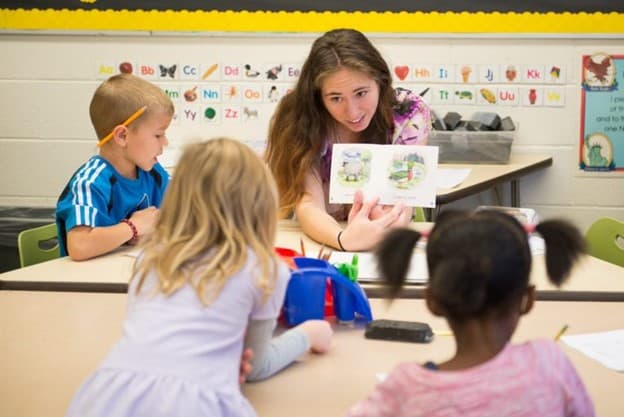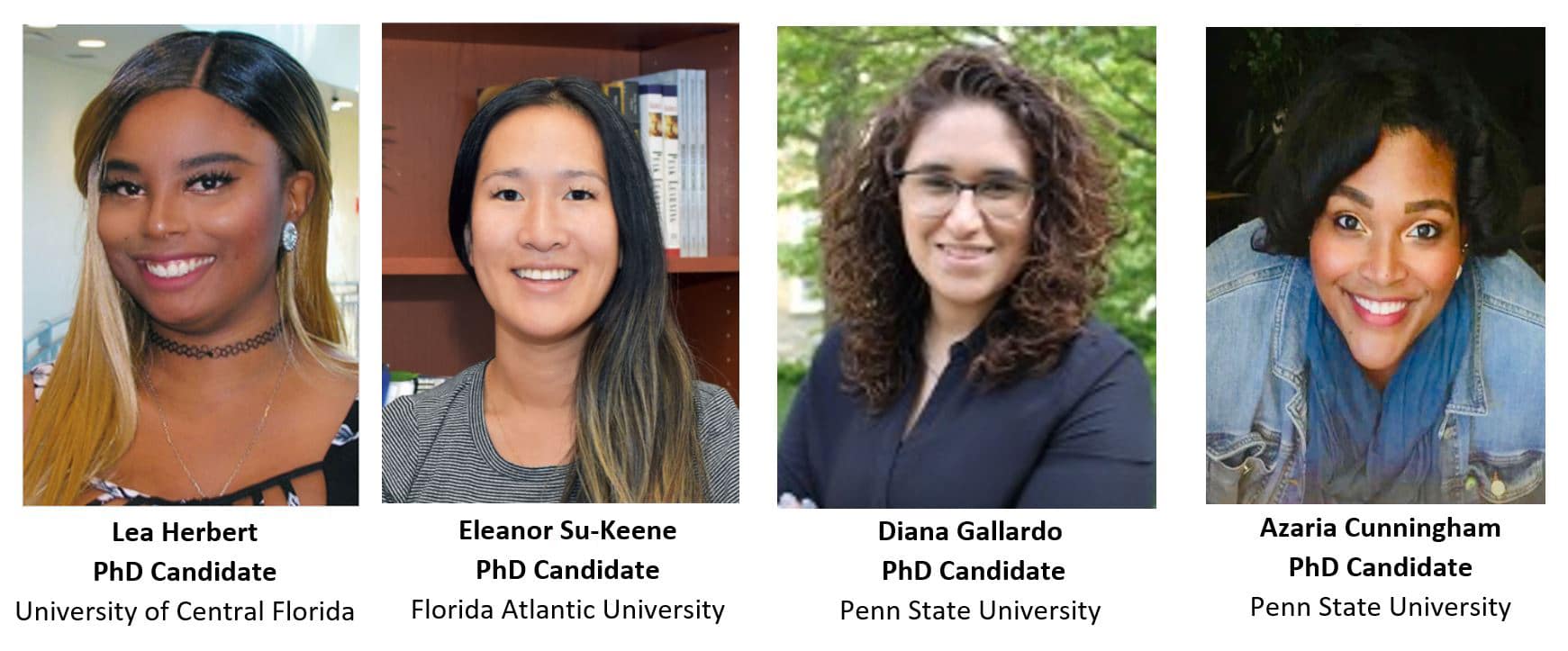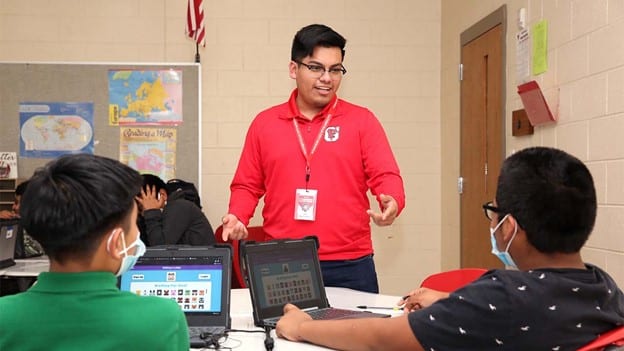21 Mar2022
By Molly Davis
This article originally appeared on Illinois State University website and is reprinted with permission.

Illinois State University (ISU) is coordinating the Illinois Tutoring Initiative in partnership with the Governor’s Office, the Illinois State Board of Education (ISBE), the Illinois Board of Higher Education (IBHE), and the Illinois Community College Board (ICCB). The program will provide tutoring for approximately 8,500 Illinois students during the two-year period. This is one of four state initiatives aimed at learning renewal following COVID disruptions in schooling.
Six institutional partners across the state including ISU, Governor’s State University, Illinois Central College, Northern Illinois University, Southeastern Illinois Community College, and Southern Illinois University, manage tutoring in their area of the state.
18 Mar2022
By Muhammad Kara and Zach Curtis
 AACTE has partnered with graduate students from the George Washington University and the Learning Policy Institute to distribute a survey intended for current candidates for teacher licensure. Specifically, they are seeking candidates of programs that have a teacher residency, student teaching, or Grow Your Own component. Candidates of diverse racial and socioeconomic backgrounds, as well as candidates for special education bilingual education, are highly encouraged to participate. This survey will aid research on the ways in which AmeriCorps grants could be utilized to deploy highly prepared teachers to high-need schools.
AACTE has partnered with graduate students from the George Washington University and the Learning Policy Institute to distribute a survey intended for current candidates for teacher licensure. Specifically, they are seeking candidates of programs that have a teacher residency, student teaching, or Grow Your Own component. Candidates of diverse racial and socioeconomic backgrounds, as well as candidates for special education bilingual education, are highly encouraged to participate. This survey will aid research on the ways in which AmeriCorps grants could be utilized to deploy highly prepared teachers to high-need schools.
18 Mar2022
By Kaitlyn Brennan

This weekly Washington Update is intended to keep members informed on Capitol Hill activities impacting the educator preparation community. The views expressed in this post do not necessarily reflect the views of AACTE.
We are now hearing that the President’s budget request for fiscal year (FY) 2023 will likely be sent to Congress the last week of March or first week of April. The release of the budget signals the official “kick-off” for the FY 2023 appropriations cycle. Advocates will continue to work diligently to secure meaningful investments to support rebuilding and diversifying the special educator and specialized instructional support personnel.
Top Democratic Leaders Urge Biden Administration to Extend Student Loan Repayment Pause
Top Democratic leaders, including Senator Patty Murray (D-WA) who chairs the Senate education committee, are urging the Biden Administration to extend the moratorium on federal student loan repayments until at least the start of 2023. In a statement, Senator Murray noted the importance of fixing the “broken student loan system” and that borrowers are “struggling with rising costs, struggling to get their feet back under them after public health and economic crises, and struggling with a broken student loan system — and all this is felt especially hard by borrowers of color.”
15 Mar2022
By Amanda Wilkerson and Shalander Samuels
Diversifying the professoriate pipeline is fraught with both opportunities and challenges. On the one hand, while higher education continues to attract a diverse student body, fewer than 6% of professors teaching inside postsecondary institutions are minoritized. Nonetheless, organizations such as the American Association of Colleges for Teacher Education (AACTE) have made a nearly three-decade commitment to reversing the aforementioned through its programming work of mentoring doctoral students, in particular, and future educators of color in general, to take on instructional and research roles within the field and the academy. As early-career professors within college level education programs, we are both good examples of the strong influence mentorship have on diversifying the education pipeline. Furthermore, we believe that the Holmes Scholar program is a case study for investigating the potential of mentoring as a beautiful instrument for reimagining how minoritized scholars can advance in the academy. As a result, ground-breaking work was publicly disseminated to share how students transition into scholars, which was aided by both formal and informal mentorship initiatives.
15 Mar2022
By Weade James

The AACTE Holmes Program Dissertation Funding Competition, sponsored by the Council for Academic Deans for Research Education Institutions (CADREI), Teacher Education Council of State Colleges and Universities (TECSCU), Association of Independent Liberal Arts Colleges for Teacher Education (AILACTE), National Association of Holmes Scholars Alumni (NAHSA), and AACTE was held during the recent Holmes Preconference at the 74th AACTE Annual Meeting in New Orleans. The Holmes Program provides mentorship, professional development, and a supportive peer network to racially and ethnically diverse students who are pursuing graduate degrees in education. The purpose of the dissertation competition is to support Holmes Program participants’ dissertation research expenses, which are essential to the completion of their doctoral studies. These expenses vary and may include travel for ethnographic field work, specialized software, research assistance, transcription costs, and other research-related expenditures.
15 Mar2022
By Elizabeth S. Brown and David Fuentes
In this blog post, members of the Educating for American Democracy (EAD) pilot program outline how EAD can best work with educator preparation programs to address threats to schools’ ability to prepare civically engaged students, the topic of discussion at their 2022 Annual Meeting Learning Lab session.
In 2021, AACTE released a report, Revolutionizing Education for All Learners, that detailed its strategic plan for following the COVID-19 pandemic with a revolution in education intended to address long-standing and newly discovered educational inequities (AACTE, 2021). Among its strategic planning outcomes was a dedication and commitment to have democratic principles guide the education revolution, stating “democratic principles must guide what we revolutionize toward” (p.8). Democratic principles, coupled with inclusive pedagogies, specifically inquiry, encompass great potential in addressing stagnant educational gaps. AACTE’s recommitment to democratize teacher education pedagogy and principles culminated in a Pilot program, Educating for American Democracy, in which both authors were participants. Struck by the possibilities of enhanced democratic principles guiding teacher preparation and teaching and learning in K-12 schools, the authors share about the pilot experience. The authors also offer their view on the shift’s constraints and possibilities to enhance educator preparation and ultimately to address longstanding questions about equity and school outcomes in American public schools (Fuentes, 2022).
15 Mar2022
By Amy R. Kline
The New Jersey Association of Colleges of Teacher Education (NJACTE) state affiliate is excited to announce its fifth annual Day of Assessment Conference, offered this year — free of charge — over the course of two dates: March 24 and March 31, 2022. Both days will start with a featured speaker, followed by concurrent presentations by the affiliate members and other colleagues in the field. The conference began as an in-person event, and in recent years it has shifted to a virtual format that has enabled participation from a wider geographic area across the mid-Atlantic region. The annual event is part of our overall efforts to increase chapter engagement providing a valuable opportunity for faculty, administrators, and students to come together and learn from each other on various aspects of assessment in educator preparation.
 The conference will kick off on March 24 with keynote speaker, Terri Givens who will talk about “Empathy in Assessment? The Challenge of Inclusion”— a timely and thought-provoking topic in higher education. Givens will share how this work has challenged the way to approach her own assessment in the classroom, and her thinking on how to develop desired outcomes more broadly on our campuses. Givens is a professor of political science at McGill University, founder of Brighter Professional Development, and an accomplished author. Her most recent books are the memoir, Radical Empathy: Finding a Path to Bridging Racial Divides and The Roots of Racism: The Politics of White Supremacy in the US and Europe. After Givens speaks, attendees will have a choice of member presentations to attend, in the concurrent presentation track.
The conference will kick off on March 24 with keynote speaker, Terri Givens who will talk about “Empathy in Assessment? The Challenge of Inclusion”— a timely and thought-provoking topic in higher education. Givens will share how this work has challenged the way to approach her own assessment in the classroom, and her thinking on how to develop desired outcomes more broadly on our campuses. Givens is a professor of political science at McGill University, founder of Brighter Professional Development, and an accomplished author. Her most recent books are the memoir, Radical Empathy: Finding a Path to Bridging Racial Divides and The Roots of Racism: The Politics of White Supremacy in the US and Europe. After Givens speaks, attendees will have a choice of member presentations to attend, in the concurrent presentation track.
15 Mar2022
By Kaitlyn Brennan
 This weekly Washington Update is intended to keep members informed on Capitol Hill activities impacting the educator preparation community. The views expressed in this post do not necessarily reflect the views of AACTE.
This weekly Washington Update is intended to keep members informed on Capitol Hill activities impacting the educator preparation community. The views expressed in this post do not necessarily reflect the views of AACTE.
On the eve of the one-year anniversary of the passage of the American Rescue Plan Act, Congress passed a Fiscal Year (FY) 2022 Omnibus Spending Bill. The FY22 bill includes increases for education, but not nearly at the level that was originally requested by the Biden Administration. Considerable work lies ahead to secure a robust federal investment to support rebuilding and diversifying the special educator and specialized instructional personnel pipeline.
15 Mar2022
By Nicole Dunn

You may have heard the term “intersectionality” a lot lately, a term coined by Kimberlee Crenshaw in 1989 to describe how systems of oppression overlap to create distinct experiences for people with multiple identity categories. Those familiar with Crenshaw’s work know that the term was once used academically purely to shape legal conversations about racial and social injustice in systems, most notably policing. Now, “intersectionality” is part of the national lexicon, being used in the forefront of the country’s debates around racial and social injustice in the last few years; however, that should not dissuade educators from looking at their work through this lens.
For educators, intersectionality is used to frame the experiences of historical and current figures who have multiple identities when they teach. For example, during Women’s History Month, it’s important for educators to consider how the experiences of women of color, queer and trans women, women with disabilities, women with different body types, and multi-lingual women differ, and then represent them as such in their curriculum. Educators can build this intersectional teaching muscle by having conversations about their diverse experiences with one another and, as teachers, share research and resources that elevate the truth of women with intersectional identities in our schools. This is why, on International Women’s Day, we asked several of our members and staff to answer the question:
Why is integrating women’s history through an intersectional lens important to you and your work in education?
15 Mar2022
By Daniel Perez
This article originally appeared on the UTEP website.

Photo: Laura Trejo / UTEP Marketing and Communications
Ten graduate students in The University of Texas at El Paso’s teacher preparation program earned $10,000 scholarships to help finance their education and teacher certification, thanks to a $108,000 grant from the Charles Butt Foundation.
UTEP nominated students for the Charles Butt Scholarship for Aspiring Teachers who were accepted into the accelerated M.A. in Education with teacher certification program, which includes a year-long residency in partnership with El Paso County school districts. Those nominees went through two rigorous application processes — one at UTEP and the other through the Charles Butt Foundation (CBF), formerly the Raise Your Hand Texas Education Foundation.
Erika Mein, Ph.D., associate dean for undergraduate studies and educator preparation in the College of Education, is a principal investigator of CBF’s Raising Texas Teachers partner program at UTEP. She said she was elated that the CBF selected 10 UTEP students to be part of the program’s initial cohort. She described the students as committed, professional and enthusiastic.
15 Mar2022
By Agnes Hina
This article originally appeared on ung.edu and is reprinted with permission.

The University of North Georgia’s (UNG) College of Education is launching its teacher candidate residency program in fall 2022, in partnership with the Gainesville City and Hall County school districts.
The program allows preservice teachers enrolled in a UNG teacher preparation program to be hired by school districts to be full-time teachers during their senior year.
The program is meant to replace traditional student teaching, and these students are paid half the standard teaching salary, which amounts to about $23,000 annually.
11 Mar2022
By Meghan Grenda

Have you renewed your AACTE membership for 2022? If not, the deadline to renew is quickly approaching.
Unrenewed memberships expired on December 31, 2021, and are set to be deactivated at the end of this month, on March 31, 2022.
Below are just a few of the resources your membership gives you access to:
11 Mar2022
By Michael Rose
 Congressional leaders announced this week that they have come to an agreement on the annual spending bills that will fund the government for the remainder of the fiscal year. The government has been operating under a continuing resolution since October (a continuing resolution funds the government at the previous year’s levels). This agreement will allow Congress to begin work on the fiscal year 2023 spending bills, which should be signed into law by September 30.
Congressional leaders announced this week that they have come to an agreement on the annual spending bills that will fund the government for the remainder of the fiscal year. The government has been operating under a continuing resolution since October (a continuing resolution funds the government at the previous year’s levels). This agreement will allow Congress to begin work on the fiscal year 2023 spending bills, which should be signed into law by September 30.
The House and Senate are expected to pass the legislation in the coming days and President Biden is expected to sign it into law.
09 Mar2022
By AACTE

Thank you for joining over 1,300 education leaders at AACTE’s 74
th Annual Meeting in New Orleans to revolutionize and transform the profession. The collective energy of this year’s attendees made for an exciting return to in-person collaboration. We hope you left feeling energized, inspired, and ready to rethink, reshape, and reimagine the future of education.
Key Reminders:
08 Mar2022
By Nicole Dunn

AACTE launches it celebration of 2022 Women’s History Month on International Women’s Day with a blog on the “herstory” of women leaders in education preparation. To help AACTE celebrate women leaders in the profession, please nominate a women-identified leader in educator preparation whom you would like us to recognize in Ed Prep Matters before the month ends.
The term “herstory” was coined in 1970 by Robin Morgan, editor of Sisterhood is Powerful, An Anthology of Writings from the Women’s Liberation Movement. It is used today to acknowledge the way in which women have been left out of our historical narratives. Most schools teach history through the lens of America’s default norms: white, cisgendered, and male. AACTE is committed to supporting its membership with their efforts to prepare candidates to equitably represent intersectional female narratives across disciplines.








 AACTE has partnered with graduate students from the George Washington University and the Learning Policy Institute to
AACTE has partnered with graduate students from the George Washington University and the Learning Policy Institute to 

 The conference will kick off on March 24 with keynote speaker, Terri Givens who will talk about “Empathy in Assessment? The Challenge of Inclusion”— a timely and thought-provoking topic in higher education. Givens will share how this work has challenged the way to approach her own assessment in the classroom, and her thinking on how to develop desired outcomes more broadly on our campuses. Givens is a professor of political science at McGill University, founder of Brighter Professional Development, and an accomplished author. Her most recent books are the memoir, Radical Empathy: Finding a Path to Bridging Racial Divides and The Roots of Racism: The Politics of White Supremacy in the US and Europe. After Givens speaks, attendees will have a choice of member presentations to attend, in the concurrent presentation track.
The conference will kick off on March 24 with keynote speaker, Terri Givens who will talk about “Empathy in Assessment? The Challenge of Inclusion”— a timely and thought-provoking topic in higher education. Givens will share how this work has challenged the way to approach her own assessment in the classroom, and her thinking on how to develop desired outcomes more broadly on our campuses. Givens is a professor of political science at McGill University, founder of Brighter Professional Development, and an accomplished author. Her most recent books are the memoir, Radical Empathy: Finding a Path to Bridging Racial Divides and The Roots of Racism: The Politics of White Supremacy in the US and Europe. After Givens speaks, attendees will have a choice of member presentations to attend, in the concurrent presentation track. This weekly Washington Update is intended to keep members informed on Capitol Hill activities impacting the educator preparation community. The views expressed in this post do not necessarily reflect the views of AACTE.
This weekly Washington Update is intended to keep members informed on Capitol Hill activities impacting the educator preparation community. The views expressed in this post do not necessarily reflect the views of AACTE. 



 Congressional leaders announced this week that they have come to an agreement on the annual spending bills that will fund the government for the remainder of the fiscal year. The government has been operating under a continuing resolution since October (a continuing resolution funds the government at the previous year’s levels). This agreement will allow Congress to begin work on the fiscal year 2023 spending bills, which should be signed into law by September 30.
Congressional leaders announced this week that they have come to an agreement on the annual spending bills that will fund the government for the remainder of the fiscal year. The government has been operating under a continuing resolution since October (a continuing resolution funds the government at the previous year’s levels). This agreement will allow Congress to begin work on the fiscal year 2023 spending bills, which should be signed into law by September 30.  Thank you for joining over 1,300 education leaders at AACTE’s 74th Annual Meeting in New Orleans to revolutionize and transform the profession. The collective energy of this year’s attendees made for an exciting return to in-person collaboration. We hope you left feeling energized, inspired, and ready to rethink, reshape, and reimagine the future of education.
Thank you for joining over 1,300 education leaders at AACTE’s 74th Annual Meeting in New Orleans to revolutionize and transform the profession. The collective energy of this year’s attendees made for an exciting return to in-person collaboration. We hope you left feeling energized, inspired, and ready to rethink, reshape, and reimagine the future of education. 